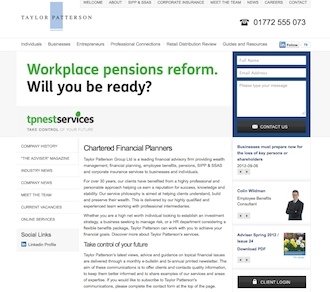Preston-based financial advisory group Taylor Patterson is warning business owners not to forget about VAT when purchasing a commercial property through their pension.
Many with a Small Self Administered Pension Scheme (SSAS) opt to purchase commercial property through their pension scheme and lease it back to the business at good rates. There are a number of additional tax saving benefits of doing this, including capital gains tax exemption and tax relief on pensions contributions.
In the process, the VAT – and the big question of who pays it – can be forgotten, and at 20 per cent of the value of the property, ignoring the issue could provide an unwelcome surprise during the mortgage transaction.
Taylor Patterson's advice is to establish early on in the transaction whether or not a commercial property has an 'Option to Tax' attached to it, or whether VAT will be charged on the property by the vendor.
{desktop}{/desktop}{mobile}{/mobile}
Property owners and landlords can apply this option to a property if they wish so that they can recover VAT on property repairs or construction costs.
In some cases, with the agreement of the vendor, and usually where the property is being acquired subject to an existing lease, it may be possible to treat the transaction as the 'Transfer of a Going Concern' where no VAT is paid on the purchase.
Whether or not tax is being charged by the vendor, it is up to the pension fund holder to decide whether to tax the property once it has been purchased. It isn't possible to opt to tax a property without being VAT registered.
Pension administration manager Warran Bolton, says: "Opting to tax the property is an important decision, and one that can't be revoked for 20 years or for as long as you own the property.
"On the upside, you can reclaim any VAT you paid on the purchase price, but you have to charge VAT when the property is sold. This could make the property unattractive to potential buyers who aren't themselves VAT registered and so would not be able to reclaim the charge.
"It's a complex balancing act and we always recommend that people take specialist tax advice because everyone's circumstances are different."

